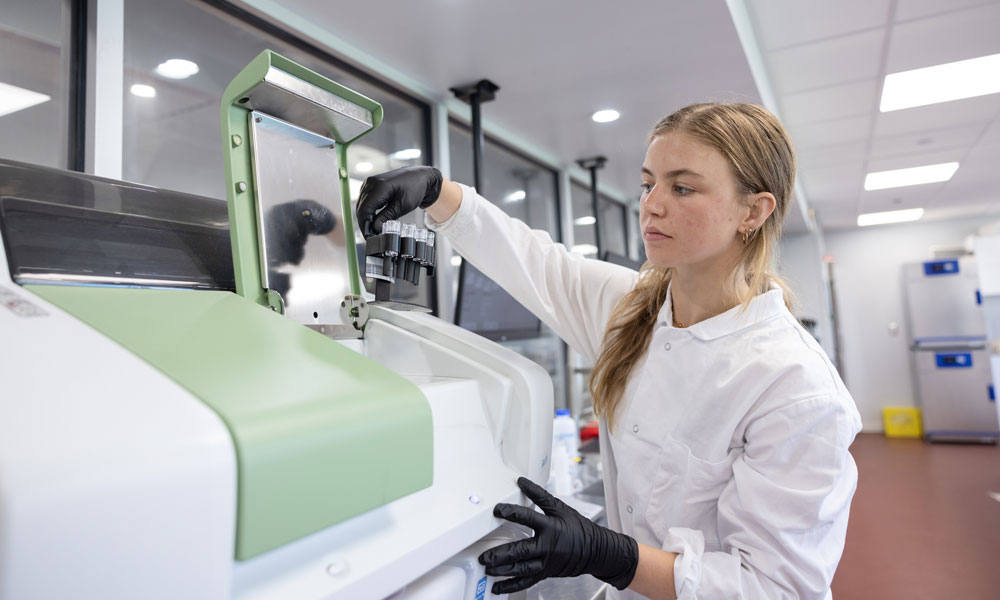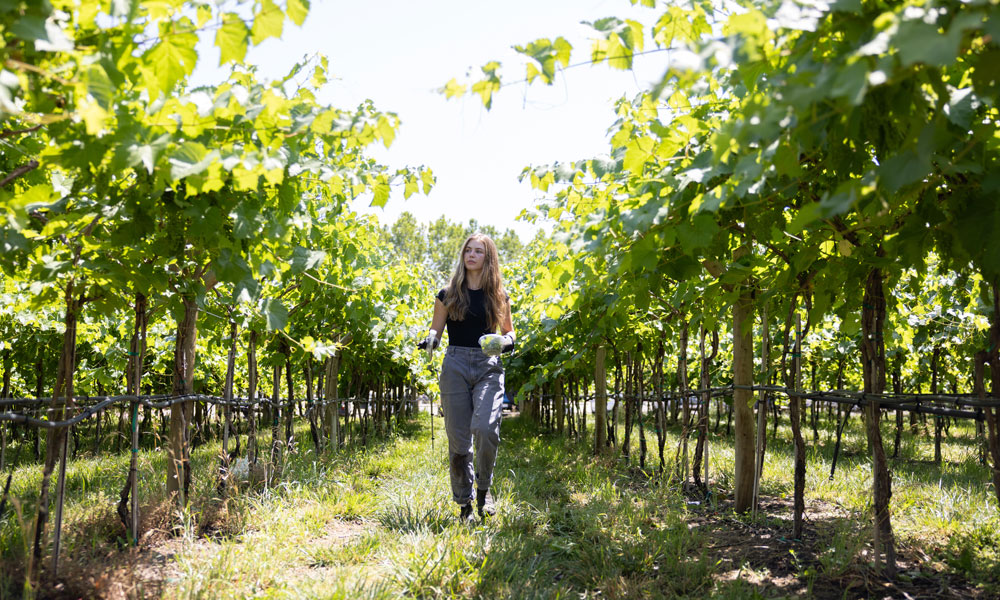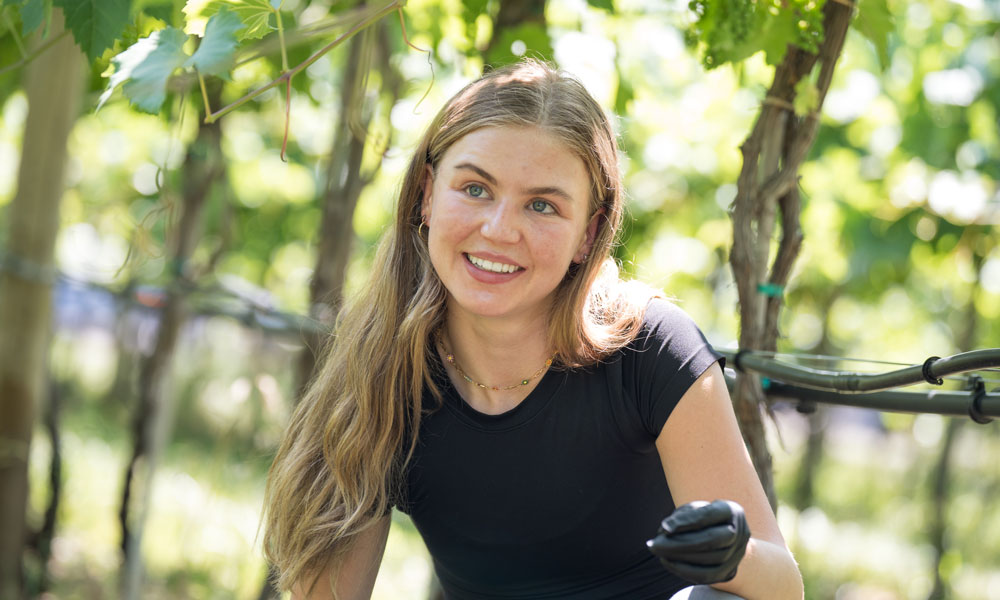
Here, undergraduate biochemistry student Brooklyn Becker inspects grape vines for signs of health and disease. This helps winemakers better understand what nutrients a plant is deficient in or which nutrients are present in excess.
The pungent smell of fermenting grapes fills the air as undergraduate biochemistry student Brooklyn Becker starts her co-op shift at Frind Estate Winery in West Kelowna. After a few months on the job, she knows to expect the unexpected.
“Everything depends on what the winemaker needs that day,” explains Becker, who chose to attend UBC Okanagan after the region’s plentiful mountains and lakes lured her from Alberta.
“We could be sampling wines and bringing them back to the lab for analysis on various machines or analyzing soil samples from the vineyards. In the spring, we’re analyzing the leaves, and the lab runs nearly 24 hours a day during harvest.
“It’s a fast-paced environment, but no amount of class time could replicate the hands-on skills I learn at Frind.”

Co-op student Brooklyn Becker inserts a wine sample into the Gallery, an instrument used to analyze the majority of Frind’s wine and soil data.
At first, Becker wasn’t entirely convinced co-op was the route for her; she worried about being a year behind her friends and classmates, but her mother ultimately provided some sage advice: “She asked me, ‘Why would you wait to get experience until after you graduate? Why not get some experience now and then finish your degree?’
“I’m really glad I decided to go into co-op, because the experience gained from working in a professional field has given me so many more practical skills.
“For students, I think these skills will help every other area of your life, whether it’s your studies, graduate work, your resume or portfolio. It’s been amazing.”
During her time at Frind, Becker has not only been exposed to one of the Okanagan’s most advanced wine labs but also worked alongside colleagues with backgrounds in biology, microbiology and earth sciences.
“I would encourage any student to just approach your professor if you need help or are interested in research, because they won’t say no. Everyone at UBC Okanagan wants to create relationships and encourage you to get the most out of your degree.”
Access to those different areas of expertise has been invaluable to Becker, who notes that she hasn’t had a chance to take many courses in these fields.
“I’ve learned a lot; having people in your work environment teach you the practical side of their degree is incredible.”
Create your own co-op job
As Becker searched for opportunities through UBC Okanagan’s co-op job board, she admits to being picky.
“I had a hard time finding a job I wanted because I was interested in wine science, and there weren’t many jobs available,” explains Becker. “The co-op office is great because they give you the chance to create your own opportunity, which is what I did.”
After attending a talk hosted by UBC Okanagan’s Dr. Wesley Zandberg, an Associate Professor in Chemistry, Becker was amazed by his research on smoke taint in grapes.
“I approached Dr. Zandberg after the talk and told him I was interested in this kind of fieldwork. We ended up meeting a few more times and he connected me to Tara Holitzki, my current manager at Frind.
“I’m the winery’s first co-op student, so Tara and I worked with the co-op office to create a very tailored role that I wouldn’t have found if I had gone straight off the job board. I’m really happy about that.”
She adds that UBC Okanagan’s co-op office has been an incredible support throughout her time at the university, encouraging connections between students and professors to further educational opportunities.

A regular part of Becker’s work at the vineyard involves checking the plants to analyze vine health.
“I’ve never had a professor refuse to help. I would encourage any student to just approach your professor if you need help or are interested in research, because they won’t say no. Everyone at UBC Okanagan wants to create relationships and encourage you to get the most out of your degree.”
Co-op job opens many doors
Becker says her co-op job has given her an incredible opportunity in her educational journey.
“Don’t get me wrong, traditional lectures are amazing. They’re great for getting information required for a degree into students’ brains. But I don’t think anything is equivalent to working in a professional field for 12 months—the critical thinking, adaptability and general workplace skills I’ve learned are incredible.”
She says that her time at Frind Estate Winery analyzing smoke taint in grapes and wine has further opened her eyes to the possibilities and complexities involved with biochemistry.

Becker says she’s passionate about the environment and wants to use her education and experience to help the wine industry improve—something she’s learned thanks to her co-op experience.
The research allows Frind to develop predictive models for smoke-taint potential in wine, which not only supports the local agriculture industry, but also helps growers better understand how to promote a more sustainable wine industry.
A critical component of her work has been responding to the climate crisis and the destructive 2023 wildfire season—skills Becker believes are also applicable to diverse areas like food technology, sustainability and agricultural practices.
“Focusing on this job and this amazing research for 12 months has given me a wider perspective of what is possible from an undergraduate degree. I’d love to move forward with more research, especially with Dr. Zandberg and the wine industry here in the Okanagan.
“I’m passionate about the environment, and I love the thought of using my education and experience to help an industry improve—all thanks to my co-op experience.”






